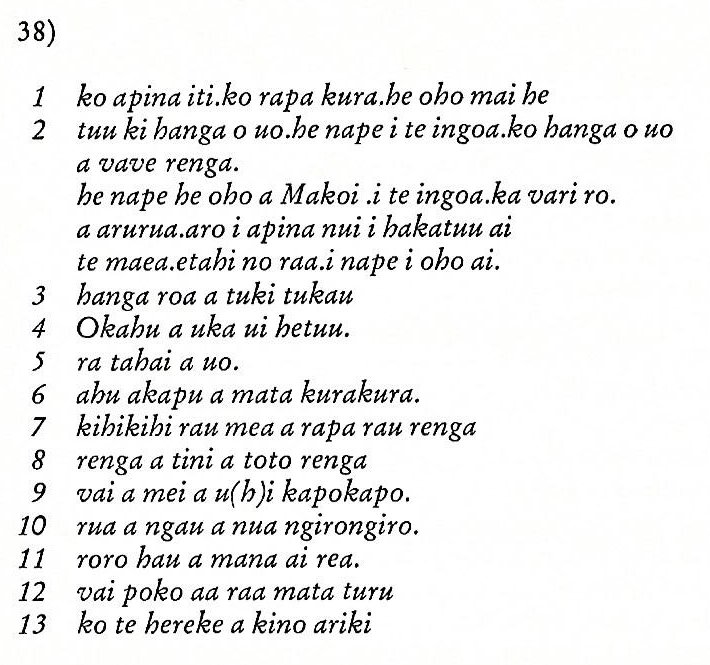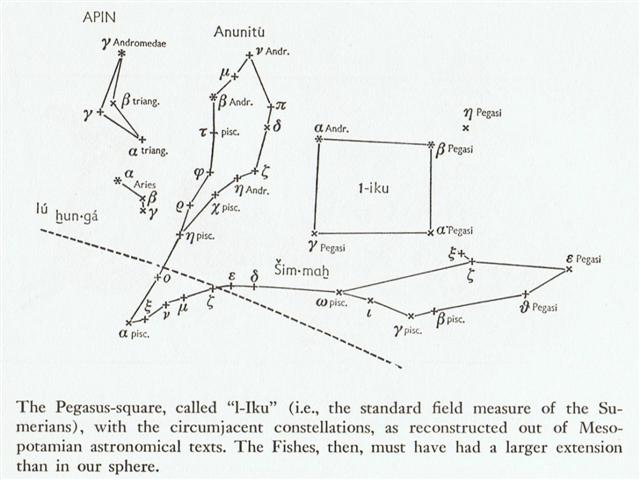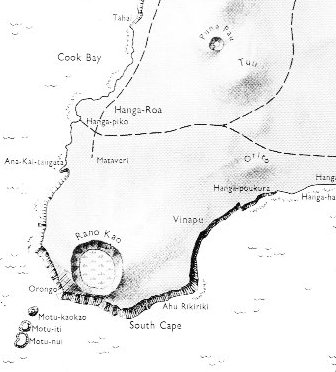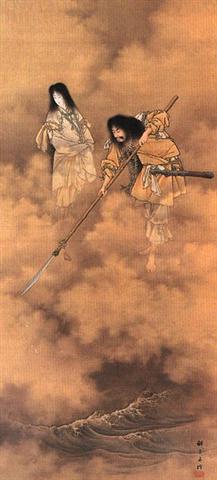
|
he otea ki te ha o te
raa.he ea hokoou anake |
It
grew light on the fourth day, and they all
got up (together). They climbed down, went
on, and arrived at the bay. They hurried,
went into the water, and reached the islet
(off the shore). The wave began to move, and
they all rode the wave (literally, 'they
turned their lower body into the position of
a turtle, coasted like a sled, they all came
in the position of a turtle'). |
| he turu he
oho he tuu ki mua ki te hanga he rerere |
| he iri he
tuu ki runga ki te motu he tata mai te va(-) |
| ve.he tiaeve
mai i te honu he pei he oho mai te |
| honu anake. |
| he oho mai
te Honu a Ira.a te
rara matau.he hi(-) |
Ira
rode the wave [Wave] toward the right side.
He looked diagonally [he hira] toward
the land, looked in the direction of Ruhi
Hepii, and the ornament of Ruhu Hepii [ruhi
hePii] shone brightly [he rapa]. |
| ra mai te
mata a uta he ui mai ruhi hepii |
| he rapa atu
te rei.mai ruhi
hePii. |
| On
Mangareva they said te rara maori for
the right hand ('branch'). In Manuscript E
we should here probably read te rara
matau as te rara ma'tau - see for
instance a te tapa mata'u o te haga,
on the right side of the bay. In contrast
should te rara maui (cfr E:32) be
read as te rara maúi - as in te
va'e mata'u, te va'e maúi, right foot,
left foot.
Rei.
1. To tread, to trample on:
rei kiraro ki te va'e. 2. (Used
figuratively) away with you! ka-rei
kiraro koe, e mageo ê, go away, you
disgusting man. 3. To shed tears: he rei
i te mata vai. 4. Crescent-shaped breast
ornament, necklace; reimiro, wooden,
crescent-shaped breast ornament; rei
matapuku, necklace made of coral or of
mother-of-pearl; rei pipipipi,
necklace made of shells; rei pureva,
necklace made of stones. 5. Clavicle. Îka
reirei, vanquished enemy, who is kicked
(rei). Vanaga. T. 1. Neck. 2.
Figure-head.
Rei mua
= Figure-head in the bow.
Rei muri = Figure-head in the
stern. Henry. Mother of pearl;
rei kauaha,
fin. Mgv.:
rei, whale's tooth. Mq.:
éi,
id. This is probably associable with the
general Polynesian
rei,
which means the tooth of the cachalot, an
object held in such esteem that in Viti one
tooth (tambua)
was the ransom of a man's life, the ransom
of a soul on the spirit path that led
through the perils of Na Kauvandra to the
last abode in Mbulotu. The word is
undoubtedly descriptive, generic as to some
character which Polynesian perception sees
shared by whale ivory and nacre.
Rei kauaha
is not this
rei; in the Maori
whakarei
designates the carved work at bow and stern
of the canoe and Tahiti has the same use but
without particularizing the carving:
assuming a sense descriptive of something
which projects in a relatively thin and flat
form from the main body, and this describes
these canoe ornaments, it will be seen that
it might be applied to the fins of fishes,
which in these waters are frequently
ornamental in hue and shape. The latter
sense is confined to the Tongafiti
migration. Reirei, to trample down,
to knead, to pound. Pau.: Rei-hopehopega,
nape. Churchill. |
| he hakahoki
he oho te honu a te rara maui |
He
went back out into the sea, and the movement
of the wave was toward the left side. Again
he glanced, this time in the direction of
Pu, and the ornament of Pu shone brightly. |
| he hira te
mata hokoou a pu.he rapa mai te |
| rei o pu. |
| he hakahoki
hokoou a vaenga
he rapa mai |
Again he went back into the sea. From the
middle, the two necklaces of the two
figurines shone (toward him). |
| te tuitui
reipa.erua o te ngao o te moai erua |
|
Vae.
Foot, leg; te va'e mata'u, te va'e maúi,
right foot, left foot. Va'e ruga,
va'e raro, quick and light, without
detour (lit.: foot up, foot down). Ka-oho
koe ki a nua era va'e ruga va'e raro, ina
ekó hipa-hipa, hurry straight to your
mother, do not make any detours. Va'e pau,
misshapen foot, clubfoot. Vae, to
choose. Vaega, middle, centre; i
vaega o, in the middle of. Vanaga. 1.
Foot, paw, leg, limb; vae no roto,
drawers; karikari vae, ankle. P Pau.:
vaevae, foot, leg. Mgv.: vaevae,
id. Mq.: vae, id. Ta.: vaevae,
avae, id. 2. Pupil. 3. To choose,
elect, prefer, promote, vote; vavae,
to destine, to choose; vaea (vae
2), pupil. Vaeahatu (vae 1 -
ahatu): moe vaeahatu, to sleep
sprawling with legs extended. Vaega,
center, middle, within, half; o vaega,
younger; ki vaega, among, between,
intermediate. P Pau.: vaega, the
middle. Mgv.: vaega, center, middle.
Mq.: vaena, vavena, vaveha,
id. Ta.: vaehaa, half. Vaehakaroa
(vae 1 - roa): moe
vaehakaroa, to sleep with legs stretched
out. Vaehau (vae 1 - hau
3), pantaloons, trousers. Vaeherehere
(vae 1 - here 1), to attach by
the paw. Vaerere (vae 1 -
rere 1), to run. Churchill. Ta.: 1.
Timbers of a boat. Ha.: wae, knees,
side timbers of a boat. 2. To share out.
Sa.: vae, to divide, to share. Ma.:
wawae, to divide. Churchill. |
| he oho mai
te honu he tomo a rio.he nape iho i te |
His ride on the
wave ended in Rio, |
|
E:37 |
| ingoa ko
hanga o rio.he noho a Ira.i uta.he haka(-) |
and
therefore the name 'Hango O Rio' was given.
Ira remained [he noho] on shore [i
uta], pondered [he hakatopa],
and said, 'This is well done! Ruhi to the
right, Pu to the left, and Hinariru Nui and
Hinariru Iti in the middle [ki te tini]'. |
| topa.he ki
ku riva.a ko
ruhi ki te rara ma(-) |
| tau.ko pu ki
te rara maui.ko hinariru nui.ko |
| hinariru iti
ki te tini. |
| he ea anake
he iri he oo ki roto ki te ana.he ki |
They all [anake] got up [he ea],
climbed up [he iri], and entered into
[he oo ki roto ki] the cave [te
ana].
Ira said the following to Makoi: 'You [ko
koe] are the one who shall stay here. We
[ko matou], on the other hand, have
to turn around'.
Makoi replied, 'All right with me!'
Then Ira continued to speak to Makoi:
'Tomorrow, when it grows light, set out [hoki
koe] and name the places [te kona] beginning with
Apina'.
Makoi replied, 'How [pehe] shall I
[au] give the names?'
Again [hokoou] Ira spoke, 'In Hiva
are the names that are to be taken to name
(the places of the new land).' |
| a Ira.ka ki
era.kia makoi ko koe tae mee mo |
| noho.Ko
matou mo hoki.he ki mai a Makoi.ku mao |
| ana.he ki
hokoou a Ira.kia Makoi.ana otea |
| apo.ka hoki
koe ka oho ka nape i te ingoa o te |
| kona.mai
apina ana rae
te ingoa.he kia mai |
| a Makoi.kia
Ira. Pehe au ana nape i te ingoa |
| he ki hokoou
mai a Ira.i hiva te ingoa mo too |
| mai mo nape. |
|
Ku. Verbal prefix, used for past
events the effects of which are still
lasting. The verb then takes the suffix
-ana which is very often contracted to
-á . In familiar conversation the
prefix -ku is often omitted and only
the suffix -á is used. Vanaga. 1. I;
kia ku, me. 2. Verb sign: ku ohoa,
to keep out of the way, absence; ku higaa,
convinced; ku taie te tai, to
overflow, to go beyond; ku magaro, to
reconcile. 3. ? tae he mau ku hoao,
abundance. 4. Akaku, to be moved,
affected; hakaku, to groan. Mgv.:
ku, an exclamation, a cry used when one
has hit the mark aimed at. Mq.: ú, an
exclamation of sorrow. 5. Gaoku, to
eat greedily. Mgv.: ku, to be
satiated, glutted. Churchill.
... If we can equate
mulApin (Triangulum) with the Easter
Island location Apina Nui, then we
could guess Apina Iti was the
Southern Triangle.

The Polynesians could
not end a word with the consonant 'n' and
therefore the famous mulAPIN should
have become the Easter Island place Apina
... |
|
he otea he ea a
Makoi.he oho he tuu ki a(-) |
It
grew light [on the 5th day] and Makoi got
up. He set out and came to Apina. When he
arrived there he gave the name |
| pina.he tuu
he nape i te ingoa. |
|
E:38 |
| 1
ko apina iti.ko rapa
kura.he oho mai |
'This is Apina Iti, this is Rapa Kura.'. He
went on and came to Hanga O Ua [Uo].
He gave the name 'This is Hanga O Ua [Uo]
of the beautiful wave (vave renga).'
Makoi went on, giving names, until he had
made a (complete) circle around both sides
(of the island).
In Apina Nui
a stone (maea) was erected [hakatuu],
saying that the naming was done on a (round)
trip during a single day. |
| 2 he
tuu ki hanga o uo.he
nape te ingoa.ko hanga o uo |
|
a vave renga. |
|
he nape he
oho a Makoi .i te ingoa.ka
vari ro |
|
a
arurua.aro i
apina nui i hakatuu ai |
|
te
maea.etahi no raa.i nape he oho ai. |
|
Vari.
1. Menstruation, period (also: tiko).
2. To tack, to veer (nautical);
ku-vari-mai-á te miro, the boat arrives,
have veered [around Rano Kau].
Vanaga. About, circumference, to turn in a
circle; hakavari, pliant, to bend,
square; varivari, about, to go
around; vavari, a garland;
varikapau, circumference, to surround, a
compass, to admire; hiriga varikapau,
to go in a ring; pa varikapau, to
close in; varitakataka (vari-taka
3) to surround. Churchill. Pau.: Vari,
marsh, mire, dirt. Ta.: vari, dirt,
mud. Rar.: vari, mud. Churchill.
Mgv.: Vari, paste well diluted. Mq.:
vaivai, to dilute, to thin. Ha.:
waliwali, soft, pasty. Churchill.
Áruáru, reduplication of aaru: to
grab firmly. Vanaga. 1. To pursue. P Mgv.:
aruaru, to run after, to chase, to
follow. Ta.: aruaru, to pursue. 2. To
raise in waves, undulation. P Pau.:
puhigaru, a bubble of water. Mgv.:
garu, foam, froth. Mq.: naú,
waves. Ta.: aru, billow, wave, flood.
3. (haruharu). Churchill. Haruharu.
To rob, to steal, to arrest, to seize, to
cling, to grasp unexpectedly, to take by
force; robber (aruaru, aaru).
Pau.: haru, to extort, to carry off,
to usurp. Ta.: haru, robber, to seize
by force. Churchill.
Aro. Face, front, side (of a
figure); ki te aro o ..., to the
front of ... Vanaga. Presence, body,
frontispiece; ki te aro, face to
face. P Pau.: aroga, the visage;
ki te aroga, opposite. Mgv.: aro,
presence, before; i te aro, in the
presence of. Mq.: aó, face, in the
presence of, before. Ta.: aro, face,
front, presence, view. It is probable that
more than one word is confounded in alo.
The significations which appear in Southeast
Polynesia are most likely derived from a
Tongafiti alo and do not appear in
Nuclear Polynesia. The alo belly and
alo chief which do occur in Nuclear
Polynesia are also probably Tongafiti, for
in Samoa and Tonga they are honorific and
applied only to folk of rank, a good
indication of borrowing by the Proto-Samoans
from Tongafiti masters. Churchill. In the
Hawaiian group, the western portion or side
of an island was called 'the front', ke
alo, of the land, and the eastern side
was called 'the back', ke kua. The
reason of such designations must be sought
in the fact of the arrival of the
inhabitants from the west. Fornander.
... Ira got up,
climbed up [he ea], went on, and
reached Ruhi Hepii. He drilled a hole into
the stone. After the hole was deep enough,
he took the ornament (rei) and put it
into the hole so that the shiny side (rapa)
was turned outward. [He gave the name Ruhi
Hepii.]
He turned around, climbed down [he turu],
went on, and entered the cave of Pu
Pakakina.
When he arrived there he sat down.
The young kinsmen
arrived and rested. It grew light. On the
second day, Ira said again, 'Go back to
riding the waves!'. They all went back out
there.
Ira got up [he ea a Ira] and again
picked up the (second) ornament. He took it
[he mau], went on, and came to
Apina Nui,
drilled a hole into the stone, put the
ornament in the hole, with the shiny side [te
rapa] to the outside, and gave (the
place) the name 'Pu' ... (E34) |
| 3
hanga roa a tuki
tukau 4
Okahu a
uka ui hetuu. |
MY OWN
IDEAS: |
| Hanga Roa (the
Great Bay) for making landfall (tuki)
in order to multiply (ku-kau)
together with
Okahu (oka-hu), the maiden
star-watcher (uka ui hetuu). |
|
Tutu.
1. Circle of fishing nets arranged in
the shape of a funnels or baskets. 2. To
light a fire; he-tutu i te ahi: to
burn something. 3. To hit, to strike, to
beat. Tûtú, to shake (something)
clean of dust or dirt; he-tûtú te oone o
te nua, to shake the dirt off a nua
cape. Tutuhi, to reject the
responsibility for a mistake onto one
another, to blame one another for a mistake
(see tuhi). Tutuki, to
stumble, to trip. O tutuki te va'e,
in order not to trip. Tutuma,
firebrand, partly burnt stick. Tuturi,
to kneel. Vanaga. 1. To beat bark for cloth.
PS Pau., Mgv., Mq., Ta.: tutu, id.
Sa., To., Fu.: tutu, id. 2. A broom,
to sweep, to clean. Mq.: tutu, to
beat out the dust. 3. To shake, to winnow.
Mgv.: tutu, to tremble, to leap. Mq.:
tutu, to shake. 4. To kindle, to
light, to ignite, to set fire, to burn. Mq.:
tutu, to burn, to set fire. 5. To
stand; hakatutu, to set joists. P
Mgv., Mq.: tutu, to stand upright.
Ta.: tu, id. Tutua (tutu
1): board on which bark is beaten into
cloth. PS Mgv.: tutua, a cloth
beater. Mq., Ta.: tutua, wood on
which cloth is beaten. Sa., Fu.: tutua,
id. Tutui: tutui ohio, chain,
tutui kura, shawl. Mq.: tuitui
kioé, chain. Tutuki: shock,
contusion, to run against, to collide;
tukukia, to run foul of. P Pau.:
tukituki, to strike, to pound, to grind.
Mgv.: tukia, to strike against,
shock, concussion. Mq.: tutuki, id.
Ta.: tui, id. Tutuma: 1. (tutu
- ma) a live coal. 2. Tree trunk T (?
tumu). Tutumata, ligament of
the eye, orbit, eyelid. T (tutumate,
eyelid G). Tutuu, bristling.
Churchill. Kau.1. To move one's
feet (walking or swimming); ana oho koe,
ana kau i te va'e, ka rava a me'e mo kai,
if you go and move your feet, you'll get
something to eat; kakau (or also
kaukau), move yourself swimming. 2. To
spread (of plants): ku-kau-áte kumara,
the sweet potatoes have spread, have
grown a lot. 3. To swarm, to mill around (of
people): ku-kau-á te gagata i mu'a i tou
hare, there's a crowd of people milling
about in front of your house. 4. To flood
(of water after the rain): ku-kau-á te
vai haho, the water has flooded out (of
a container such as a taheta). 5. To
increase, to multiply: ku-kau-á te moa,
the chickens have multiplied. 6. Wide,
large: Rano Kau, 'Wide Crater' (name
of the volcano in the southwest corner of
the island). 7. Expression of admiration:
kau-ké-ké! how big! hare kau-kéké!
what a big house! tagata hakari
kau-kéké! what a stout man! Vanaga. To
bathe, to swim; hakakau, to make to
swim. P Pau., Mgv., Mq.: kau, to
swim. Ta.: áu, id. Kauhaga,
swimming. Churchill.
Kaukau. 1. Horizontal poles of a
frame (of a hare paega, or a paina
statue): he-hakatu'u te tama o te
paina, he-kaukau, they erect the
vertical poles of the paina then they
lay upon them the horizontal ones. 2. Group
of people: e-tahi tuitui reipá i Te Pei,
ekó rava'a e-varu kaukau; i-garo ai i
Hiva, i te kaiga, a necklace of
mother-of-pearl is on te Pei, few
will find it (lit: eight groups of people);
it has remained in Hiva, in our
homeland. 3. To go through, to pass through
in unison; he-hogi-mai te ûka i te e'eo o
te pua kaukau-á i roto ite hare, the
girl smelt the fragrance of the pua
wafting inside the house. 4. Newborn baby's
first hand and feet movements (kaukau
or kau). The five stages of a
baby's development are: kaukau, puepe,
tahuri, totoro, mahaga. Puepue =
said of a newborn baby when, a few weeks
old, it begins to distinguish people and
objects: ku-puepue-á te poki.
Tahuri = of a new-born baby, to move
from side to side: ku-tahuri-á te poki.
Totoro = to crawl; ki totoro te
poki, when the baby crawls. Mahaga
= baby when able to stand by itself. Vanaga.
Oka.
1. Lever, pole; to dig holes in
the ground with a sharpened stick, as was
done in ancient times to plant vegetables;
used generally in the meaning of making
plantations. 2. The four sideways poles
supporting a hare paega. Okaoka,
to jab, to pierce, to prick repeatedly.
Vanaga. Digging stick, stake, joist; to
prick, to pierce, to stick a thing into, to
drive into, to slaughter, to assassinate;
kona oka kai, plantation; pahu oka,
a drawer. Okaoka, a fork, to prick,
to dig. Okahia, to prick. Churchill.
Hu. 1. Breaking of wind. T Mgv.,
uu, to break wind. Mq., Ta.: hu,
id. 2. Whistling of the wind, to blow,
tempest, high wind. P Pau.: huga, a
hurricane. Churchill. Mgv.: hu, to
burst, to crackle, to snap. Ha.: hu,
a noise. Churchill.
Uka hoa,
female friend, companion.
Ukauka:
1. Firewood. 2. Leathery, tough. PS Mgv.:
ukauka,
hard to chew. Mq.:
ukakoki,
leathery. Ta.:
uaua, id. Sa.:
u'a,
tough, tenacious, glutinous. To.:
uka,
sticky. Niuē;
uka, tough. Viti: kaukamea,
metal. Churchill.
 |

... The last couple of the seven generations of gods who appeared when
heaven and earth began, Izanagi and Izanami, received the
order to consolidate and fertilize the moving earth. Here Izanagi
stirs the waters of the sea with his celestial lance to produce the island
of Onokoro. The brother and sister then descended to it and
engendered the islands of Japan and numerous deities. Silk painting,
nineteenth century AD ...
|



